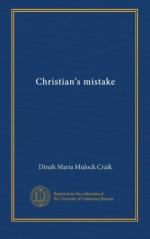“Yes, all to myself—I’ll have you all to myself,” she murmured, as she put her arms round his neck, and looked right up into his eyes. For the first time she was sure—quite sure that she loved him. And as she stood embraced, encircled and protected by his love, and thought of her peaceful life now and to come, full of duties, blessings, and delights, ay, though it had also no lack of cares. Christian felt sorry—oh, so infinitely sorry for poor Aunt Henrietta.
Chapter 12.
"Weave, weave, weave,
The tiniest thread will
do;
The filmiest thread
from a spider’s bed
Is stout enough for
you.
"Twist, twist, twist,
With fingers dainty
and small;
Let the wily net be
quietly set,
That the innocent may
fall."
Arthur never got his thrashing. The serious results, of which he had been the primary cause, for a while put his naughtiness out of every body’s head; and when, after an hour or more, Christian went up stairs, and found the poor little fellow waiting patiently and obediently in mother’s bedroom, it seemed rather hard to punish him.
She went down again into the study, and had a long talk with her husband, in which she spoke her mind very freely—more freely than she had ever done before, and told him things which had come to her knowledge concerning the children of which he, poor man! had hitherto been kept in total ignorance.
Thus taking counsel together, the father and mother decided that, except in very rare instances, corporal punishment should be entirely abolished, and never, under any circumstances, should be administered by Phillis. That Phillis’s sway was to be narrowed as much as possible, without any absolute laws being made that would wound her feelings, or show indifference to her long fidelity.
“For,” said Dr. Grey, “we must not forget, Christian, that she loved the children when they had not quite so much love as they have now.”
No, Arthur was not thrashed—was promised faithfully that Phillis should never be allowed to thrash him any more; but his step-mother made him write the meekest, humblest letter of apology to his Aunt Henrietta, which that lady returned unanswered. This, however, as Christian took some pains to explain to him, was a matter of secondary consequence. Whatever she did, he had done only what was his duty. And he was enjoined, when they did meet, to address her politely and respectfully, as a nephew and a gentleman should—as his father always addressed her, even in answer to those sharp speeches which, though in his children’s presence, Miss Gascoigne continually let fall.




